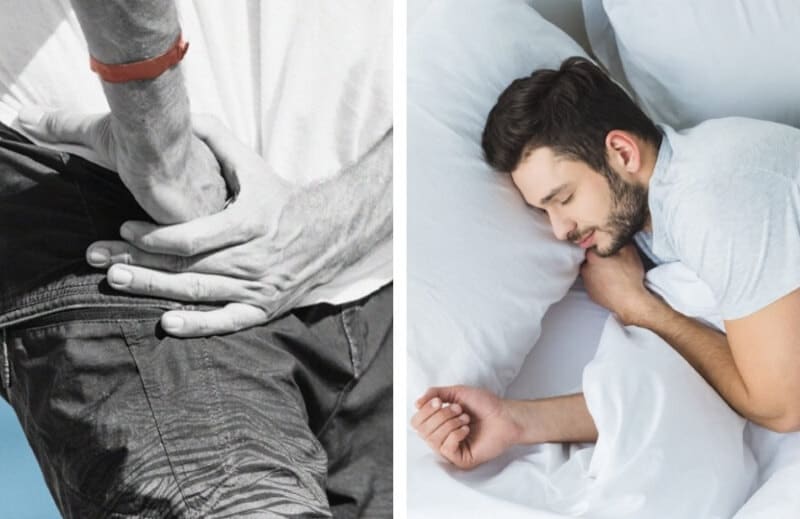

According to science Trusted Source Why don’t we fall out of bed more often? - BBC Science Focus Magazine When we sleep, a lot goes on in our bodies. We continue to breathe and growth hormone is released – we do not need to be awake for these things to happen. Similarly, we have some awareness of our body position and movements, and some people even manage to sit up or walk during their sleep! www.sciencefocus.com , we continue to have some awareness of our body position and movements when asleep. Come to think of it: some people are able to sit up and walk during their sleep. Falling out of bed is a common problem among children and the elderly. Adults who have REM behavior disorder are also prone to falling out of bed as they act out their dreams physically.
Falling out of bed has dire consequences. It reduces the quality of life dramatically as one may suffer serious injuries. Luckily, there are a few preventive measures that you can take to prevent your loved ones or yourself from falling out of bed at night. They include: safe-proofing your room, adding rails on the bed for protection, and keeping the sleep environment consistent. This article has everything you need to know about falling out of bed, from the possible causes to all the necessary precautionary measures.
This is a condition that causes one to act out their dreams physically. They may talk, scream, punch, kick, or fall out of bed. The condition is prevalent among men over the age of 50. According to the latest research Trusted Source REM sleep behavior disorder - Symptoms and causes - Mayo Clinic Rapid eye movement (REM) sleep behavior disorder is a sleep disorder in which you physically act out vivid, often unpleasant dreams with vocal sounds and sudden, often violent arm and leg movements during REM sleep — sometimes called dream-enacting behavior. www.mayoclinic.org , at least 4 to 5 people out of 1000 have REM behavior disorder, and 90% of them are men in the 50s and 60s. The research also shows that most of the patients end up with neurodegenerative disorders like Parkinson’s disease.
Frequent falls keep patients awake, and their sleep cycles are compromised, which in turn increases their risk of sleep-related anxiety and sleep-onset insomnia in the long term.
So what causes REM behavior disorder? During sleep, the human body naturally progresses through the sleep stages. REM (Rapid Eye Movement) is one of the sleep stages. It is characterized by the inactivity of all the body muscles except the diaphragm and the eye muscles, dreaming and rigorous brain activity. The body muscles are usually paralyzed during REM sleep and dreaming. Anyone who has REM behavior disorder does not experience this temporary paralysis. Therefore, they act out their dreams.
Besides falling out of bed, a person with REM behavior disorder may run, fight, kick, or defend themselves against attackers in their dreams.
Every REM cycle occurs at 90-minute intervals the entire night. It gets more intense in the last cycle of sleep which has lengthier periods before waking up.
People with REM disorder experience horrific vivid dreams. In most cases, the dreams involve human or animal attackers, and intruders. A patient with REM disorder will act out their dream violently or exaggeratedly. The symptoms for the disorder are:
Regular occurrence of these behaviors results in serious injuries to the sleeper. One may suffer bruises, minor cuts, or even severe injuries like bleeding in the brain or broken bones.
Sleep disruption is another long-term effect of REM disorder. Patients may experience excessive daytime sleepiness.
Surprisingly, REM disorder patients barely exhibit signs of sleepwalking, like walking with their eyes open or leaving the room. Also, episodes associated with the disorder are never associated with using the bathroom, eating, drinking, or any sexual activity.
REM behavior disorder is diagnosed with a sleep study known as (PSG) polysomnogram and a history of acting out dream behaviors. The PSG normally shows the unusual presence of muscle tone during REM sleep which is enough evidence that there is activity when the person is asleep.
The doctor should be able to rule out a seizure-like electrical activity which is equally a potential cause for unwanted movements during sleep. Plus, the imaging studies will show no abnormalities if there isn’t any neurodegenerative disorders, associated with REM behavior disorder. Some of the disorders that may cause abnormal movements during sleep include:
REM behavior disorder has to be managed for the patient’s and his/her bed partner’s safety. Safe proofing the bedroom or sleeping area is one of the top effective precautionary measures. It prevents severe injuries in case the patient experiences violent dream reenactments.
To safe-proof, you can remove all the sharp objects in the bedroom, and anything that can be tipped over like a nightstand or lamp. You can also put additional padding on the bed to reduce the impact of falls. Better yet, consider sleeping on a floor mattress alone.
Medication is also used to manage the disorder. When a patient takes medicine before going to bed, their movements get suppressed so that they only take fewer safety precautions.
Clonazepam is the most common medicine prescribed for the condition. It is highly effective in controlling abnormal electrical activity in the brain. Its side effects on some patients are nighttime confusion and daytime sleepiness, especially among the elderly. Patients may also become dependent on the drug.
Another popular option is Melatonin. It is a safer alternative because it helps regulate the normal sleep-wake cycle.
Medical experts maintain that a person becomes more prevalent to falling out of bed as they grow older. Falling out of bed is mainly associated with children because their ability to understand their environment during sleep isn’t fully developed. However, research shows that falling out of bed is the leading cause of fatal and non-fatal injuries among the elderly.
Aging comes with fragile bones and muscles that are less supportive. Although other medical conditions like dementia are associated with falling out of bed, this seems to be the main cause.
Here is a quick rundown of the causes of falling out of bed among the elderly:
Some seniors get confused and disoriented in the middle of the night. They may fall when they try to get out of bed unconscious. The confusion and disorientation may be a side effect of certain medications. It could also be a sign of dementia. You should talk to your doctor for a solution.
The natural brain chemistry may be compromised by certain medications. For instance, the popular sleep medication Ambien is known to cause parasomnias like sleepwalking and REM behavior disorder among some patients. It worsens sleep quality and causes unusual dreams. Anyone who experiences unusual behavior in the night anytime they take their sleep medicine should ask for an alternate prescription when they see their doctor.
Most people fall out of bed when dreaming. So many seniors report that they jump from their bed in their dream and find themselves on the ground when they wake up. Stress, sleep deprivation, and exhaustion are all causes of restlessness during sleep. Stress and exhaustion force the brain to transition through sleep cycles vigorously even when the body hasn’t caught on.
An elderly person who had surgery or a stroke recently is highly likely to fall out of their bed. The falls mostly happen when trying to get in and out of bed.
Incontinence is another physical challenge that forces seniors to leave their beds frequently at night, thus increasing the risk of falling.
Elders with deteriorating eye-sight are also highly susceptible to falling and getting injured.
Problems with mobility and balancing are a major cause for falling among the elderly. An elderly may lose balance and fall when trying to reach for a glass of water on their bed stand. Some medical conditions like paroxysmal positional vertigo (BPPV) cause imbalance among elders by making them dizzy. BPPV causes vertigo and dizziness which makes the elderly fall.
When an elderly person is unfamiliar with their surrounding and the things in their sleeping area, they are likely to bump into stuff and fall out of bed. Bedroom arrangement should be consistent for all the elderly. Consistency means not interfering with the height and position of the bed. Being consistent with the beddings is also crucial. Avoid changing to slippery bed linens that slide off or stick on the body.
A senior may roll out of bed if they are not asleep or they are toss-and-turn sleepers. Sleeping to close to the edge of the bed is another major cause of rolling out of bed. Bed rails can come in handy in such a case.
If you are taking care of an elderly person and you notice that they have suddenly started falling out of bed or are at a high risk, you should talk to a doctor for a solution.
Check them into a hospital if they have deteriorating eye sight. Eye problems like cataracts are a major cause of nighttime falls among the elderly. When solved, the senior would be able to navigate their surroundings well at night.
If the senior is on medication, then the doctor should determine if it is associated with falling out of bed and offer an alternate prescription.
For the elderly with physical challenges, physical therapy is the ultimate solution to reducing their risk of falling. Therapy improves their balance and mobility, develops muscle memory, and increases their strength.
Getting in and out of bed wouldn’t be a hassle for them.
Here are some of the precautionary measures that can prevent a senior from falling out of bed:
So many seniors fall out of bed because of unfamiliarity with their physical surroundings. You can reduce their risk of falling by installing bed rails. These should help prevent rolling out of bed. The rails will also provide hand support when the senior wakes up in the middle of the night and tries to get out of bed. In place of bed rails, you can use a huge body pillow or a pool noodle on one side of the bed to remind the senior where the edge of the bed is.
The OasisSpace bed rail remains the most acclaimed bed rail for the elderly. It has a medical adjustable bed assist rail handle and a fall prevention safety handle. Plus, it can fit King, Queen, Full and Twin bed sizes.
Consider sleeping the elderly on the floor or lower the height of the bed for an easy time getting in and out of bed. With the bed closer to the ground, the elderly will place their feet on the ground correctly and reduce the risk of falling because of imbalance.
The lighting in the room should be enough to allow the senior to see in the night. It shouldn’t be too harsh on their eyes.
A baby cot or crib is the safest place for a baby to sleep because it is built to prevent them from falling when they roll. However, every household gets to that time when they have to transfer the baby from the crib to a bed for various reasons like leaving the cot for a new baby, or the child needing to use the toilet at night after toilet training.
Here are some of the things you can do to prevent your child from falling out of bed:
Move Them to a Small Bed That Is Stable
Move the baby to a toddler bed with interesting paintings that will make them happy. Small toddler beds are made with babies in mind. They usually have long sides to keep the babies in one secure place.
Place the Bed Against the Wall or Use Pillows
If there is a side of the bed that the child may roll on, place it against the wall. You can also place pillows on the sides of the bed to act as a barrier.
Add Guard Rails to the New Bed
You can simply buy guard rails online then DIY them on the new bed. You can get professional help if you are not a DIY person. If you have no idea where to get a toddler bed rail check out the popular Hiccapop convertible crib toddler bed rail. It comes with a reinforced anchor safety and assembles in minutes.
Co-Sleep with the Baby
This is a simple solution. If you fear the child may roll off their own bed, sleep with them. Alternatively you can make them sleep on a mattress floor for a while.
Anyone can fall out of bed during sleep because of various reasons. Adults are highly likely to fall because of sleep disorders, and physical challenges like poor eyesight and mobility issues. Children fall out of bed because they are more likely to move, turn and roll out of bed. If your child has fallen out of bed a couple of times and you are worried, here Trusted Source If Your Child Falls Out of Bed, When Should You be Worried? Children older than 4 months are more likely to move, roll and turn which can be risked of falling out from the bed www.samitivejhospitals.com is what to do. Falling out of bed is inevitable for some people, especially the elderly and babies over 4 months. The good thing is, it is preventable.
We have provided all the pro tips on how to help your loved ones that are highly prevalent to falling out of bed. The first thing you ought to do is identify the possible cause of falling then take up the appropriate preventive measure.





